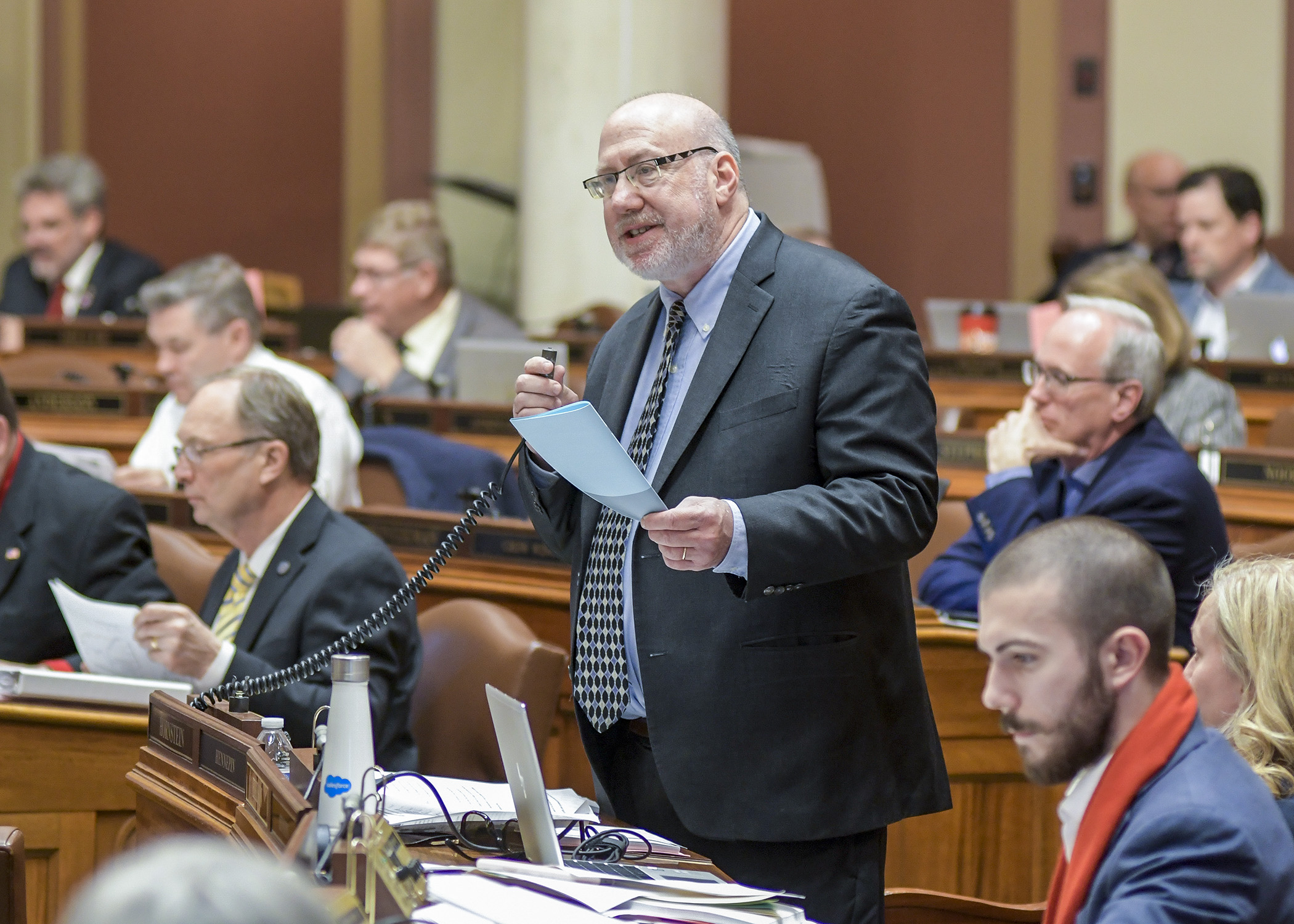House passes transportation plan that hikes gas tax for extensive road, bridge funding

The House on Monday passed an omnibus transportation finance bill that would hike the state’s gas tax by 20 cents in coming years and inject billions of new dollars into road, bridge and transit budgets that state officials say are desperately needed.
HF1555, sponsored by Rep. Frank Hornstein (DFL-Mpls), proposes to appropriate roughly $7.3 billion over the 2020-21 biennium toward Minnesota’s highways, bridges, local roads, railways, transit systems, airports and State Patrol.
Passed, as amended, on a 74-58 vote following nearly nine hours of floor debate, the bill now goes to the Senate. There, Sen. Scott Newman (R-Hutchinson) is the sponsor.
Its most attention-grabbing feature is that gas tax increase — a measure that would phase in a hike in the per-gallon motor fuels tax in five-cent increments over four years, and then raise it with the rate of inflation in following years.
The gas tax is one of Gov. Tim Walz’s top priorities. DFL leaders say it would raise nearly $600 million in funding for the state’s road and bridge infrastructure in the 2020-21 biennium, and more than $1 billion in 2022-23.
“It’s time for big thinking. It’s time to be visionary. It’s time to be bold,” said Hornstein, who chairs the House Transportation Finance and Policy Division. “It’s time to make a generational investment in our transportation infrastructure because that will ultimately move our state forward.”
An increase in some tab fees — and bringing the motor vehicle sales tax in line with other sales taxes —would also fund additional spending. Older vehicles would see a decrease in tab fees, under the bill.
If enacted, the state’s gas tax would go from among the middle of the pack to one of the highest in the nation. The House plan closely mirrors Walz’s proposal, but is sure to meet staunch resistance in the Senate. Since 2013, 30 states have increased their gas taxes.
Legislative Republicans have expressed vehement opposition to a gas tax increase, favoring an approach that uses existing dollars by shifting revenue from motor vehicle-related taxes from the General Fund toward transportation needs.
A gas tax, GOP lawmakers say, would hurt lowest-income Minnesotans the hardest.
“We’re moving Minnesota backwards by passing this transportation plan,” said Rep. Jon Koznick (R-Lakeville). “This is highway robbery … the excessive taxes in this transportation bill are going to hurt our economy.”
Transit would also see a boost under the bill. It proposes to institute a half-cent sales tax increase in the seven-county Twin Cities metropolitan area to raise roughly $400 million over the next biennium for beefed-up transit service and additional projects.
HF1555 would also authorize $2 billion in trunk highway bonding.
“Minnesotans expect our transportation system to be safe, modern, and efficient,” House Speaker Melissa Hortman (DFL-Brooklyn Park) said in a statement, “but our roads are crumbling, our bridges are structurally deficient, and our transit system is under-developed.”
Tax and fee changes
The bill includes a number of proposed tax and fee changes. Among them are those that would:
- increase the motor vehicle filing fee by $2.50 for registration renewals and $3.50 for other types of vehicle transactions;
- re-establish a surcharge on original and duplicate vehicle titles, with revenue to be deposited in a technology account that funds the state’s troubled license and registration system, MNLARS;
- raise the fee for a driver’s license by $4.50, which applies to all classes of regular, Real ID-compliant and enhanced licenses; and
- increases the filing fee by $4 for driver’s license and state ID card transactions, such as new licenses and renewals.
What else is in the bill?
Other finance measures in the bill include:
- $25 million for the Corridors of Commerce program;
- $10 million in formula-based aid to privately-run deputy registrars negatively impacted by the troubled rollout of MNLARS; and
- dedicated road and bridge funding for 700 of the state’s smallest cities with populations under 5,000.
Policy provisions
HF1555 also includes a number of policy items. Among them are those that would:
- increase filing fees for motor vehicle registration renewals, driver’s license and identification card renewals, and the issuance of a duplicate title on a motor vehicle;
- establish a state transportation goal of promoting the use of zero-emission electric vehicles;
- modify the state’s “move over” law to include recycling and solid waste vehicles;
- expand the Department of Transportation’s rail inspection program to allow two additional positions and broaden the scope of inspections that can be performed;
- direct the Metropolitan Council to expand Metro Mobility service to Lakeville and appropriate $1.9 million from the General Fund to cover costs; and
- rename various stretches of state highway in memoriam to Minnesotans of note, like former Rep. Tom Rukavina, and those who died in the line of duty.
Related Articles
Search Session Daily
Advanced Search OptionsPriority Dailies
Speaker Emerita Melissa Hortman, husband killed in attack
By HPIS Staff House Speaker Emerita Melissa Hortman (DFL-Brooklyn Park) and her husband, Mark, were fatally shot in their home early Saturday morning.
Gov. Tim Walz announced the news dur...
House Speaker Emerita Melissa Hortman (DFL-Brooklyn Park) and her husband, Mark, were fatally shot in their home early Saturday morning.
Gov. Tim Walz announced the news dur...
Lawmakers deliver budget bills to governor's desk in one-day special session
By Mike Cook About that talk of needing all 21 hours left in a legislative day to complete a special session?
House members were more than up to the challenge Monday. Beginning at 10 a.m...
About that talk of needing all 21 hours left in a legislative day to complete a special session?
House members were more than up to the challenge Monday. Beginning at 10 a.m...